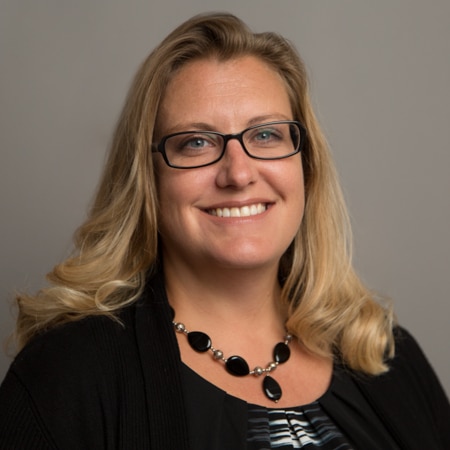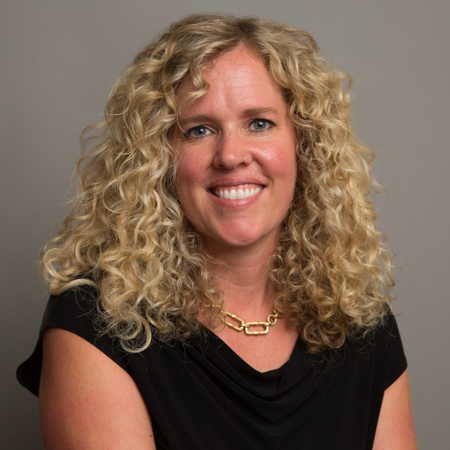LEADERS
In 2015, Heather Rouse and Cassandra Dorius came together to leverage their combined three decades of experience in education, human services, public health, and integrated data systems.
They brought together leaders from across Iowa’s departments serving young children and their families, secured training and technical assistance to develop Iowa’s model and governance structure, and obtained funding to stand up the system and use it to demonstrate value for informing policy and program improvement. I2D2 was born.
In collaboration with strong Early Childhood Iowa partners spanning diverse systems in the state, this partnership has paved the way for Iowa success. In the words of former ECI Board Chair, the tandem of Rouse and Dorius brings a “palpable level of commitment, a deep understanding of a very complicated system, and a passionate and motivating approach” to the work, which has increased the national visibility of the state of Iowa and Iowa State University as leaders in the use of administrative data systems to inform evidence-based decision making.
In 2019, the dynamic duo was invited to share the successful development of I2D2 at the National Academy of Sciences Committee on National Statistics. With a panel of experts deliberating the value of administrative data, conversations included considerations of how state and municipal integrated data systems could inform national statistical approaches.
DIRECTOR
MEET HEATHER ROUSE:
Equity is a value that has motivated Heather Rouse her entire life. Throughout her 20 years in the early childhood field, she has seen firsthand the impact of our society’s most fractured, inequitable systems.
Seeing the big picture is a skill that has served Rouse her entire life. And now as project co-director for I2D2, she is marrying her passionate commitment to vulnerable children and families with her incisive ability to identify and advocate for evidence-based, data-driven solutions to our nation’s greatest challenges.
With nearly two decades of experience studying and developing integrated data systems for policy research, Rouse brings rigor and savvy to I2D2. Her ability to communicate across technical and non-technical audiences, along with her ability to connect dots, make her an ideal leader for Iowa’s first integrated data system for decision-making.
“I view data as a way to bridge the gap between science and practice,” she says. “I am passionate about ‘connecting disconnects’ to better support children and families, and believe in the power of I2D2 as a conduit for that work.”
Rouse’s training and experience spans three U.S. states, including formal education from one of the country’s most prestigious Ivy League psychology programs.
Since 2015, Rouse has been assistant professor of human development and family studies at Iowa State University, where she conducts substantial research in partnership with state and municipal agencies on a wide variety of child and family policy subjects—including early education, child welfare and homelessness, and access to health care. She teaches courses on child and family policy as well as infant mental health, and serves on her department’s graduate education committee.
She was previously the director of health policy research at the Arkansas Center for Health Improvement and an assistant professor of pediatrics at the University of Arkansas from 2011-2015. From 2010-2011, she worked as deputy research director for the Philadelphia Policy and Analysis Center (home to Philadelphia’s integrated data system) on a policy fellowship from the Stoneleigh Foundation after earning a trio of degrees from the University of Pennsylvania (B.A., psychology, 1999; M.S.Ed., psychological services in education, 2000; Ph.D., school, community, and clinical child psychology, 2007). Her dissertation, “What’s Behind Being Behind: A Population-based Investigation of Multiple Risks and Early School Success” used Philadelphia’s integrated data system to examine health, child welfare, homelessness, and educational outcomes of young children. She has since published numerous additional articles using administrative data.
Rouse’s work building and using integrated data systems has been recognized nationally through invitations to serve on federal grant review panels and advisory groups, including as Iowa’s representative on the National ECIDS Leadership Workgroup on Stakeholder Engagement and in the Health Research Services Administration Community of Practice Data Sharing and Use in Home Visiting Programs and Policy sponsored by Child Trends. In 2019, as a result of her work with Dorius on Iowa’s Early Childhood Statewide Needs Assessment, she was invited by the Iowa Department of Human Services to serve as a state representative to the White House community listening sessions on the national child care crisis.
co-director
MEET CASSANDRA DORIUS:
Cassandra “Cass” Dorius is a proud public scientist. Her career has been consistently shaped by her lifelong desire to create social justice through work that has a direct, measurable impact on all people.
As co-director of I2D2, Dorius is living out her dream of taking science to the people. As a demographer and sociologist, she is proudly using data for the public good and driving change with her development of a robust data integration platform.
“The whole process isn’t about data,” she says. “It’s about people. What we produce works for everybody – not just the loudest voice in the room.”
As a renowned expert on family complexity, Dorius is uniquely positioned to lead I2D2. She consistently works to bring “hidden” populations out of the shadows so that policies and services accurately, fairly reflect the true diversity of the modern world.
Dorius is a west-coast native but has lived and worked across the U.S. After earning her bachelor’s and master’s degrees from Brigham Young University, she went on to receive her Ph.D. in sociology and demography from Pennsylvania State University in 2010. After completing two postdoctoral fellowships in demography at the University of Michigan in 2013, she became passionate about finding a public land-grant institution to support her as a faculty member advocating the advancement of data science for the public good. She found Iowa State University, where the institutional motto “Science With Practice” truly resonated.
Today Dorius is associate professor of human development and family studies at Iowa State, where she has proudly established the university’s Data Science for the Public Good program and co-directs the Public Science Collaborative along with I2D2. She also co-organizes the National Science Foundation’s Midwest Data Hub Summer School program in the “Data Science for the Public Good” research track.
Dorius’ scholarship has appeared in numerous peer-reviewed journals, as well as media outlets such as Time, US News and World Report, and National Public Radio. Her substantive research has shed and continues to shed important light on how family complexity is associated with the educational, health, and wealth outcomes of children and their families. Dorius understands how family relationships affect the rhythm of daily life, and her work is making an impact on the ground with quality, actionable data that is being used by governments and communities nationwide.
Dorius shares her knowledge of data science, community outreach, and evidence-based policymaking through service to such organizations as Iowa’s Two-Generation Poverty Reduction Steering Committee, Iowa Head Start, and the National Governor’s Association. She also works as a data consultant for reducing economic disparities with Third Sector Capital Partners, United Way, and FINCA International.
At Iowa State, Dorius is a member of the Data Science Curriculum Coordination Committee and the Committee on the Advancement of Student Technology for Learning Enhancement. She also currently serves as a member of the Iowa Department of Public Health’s Linkage to Care Advisory Board and as co-chair of the elections council for the National Council on Family Relations.


